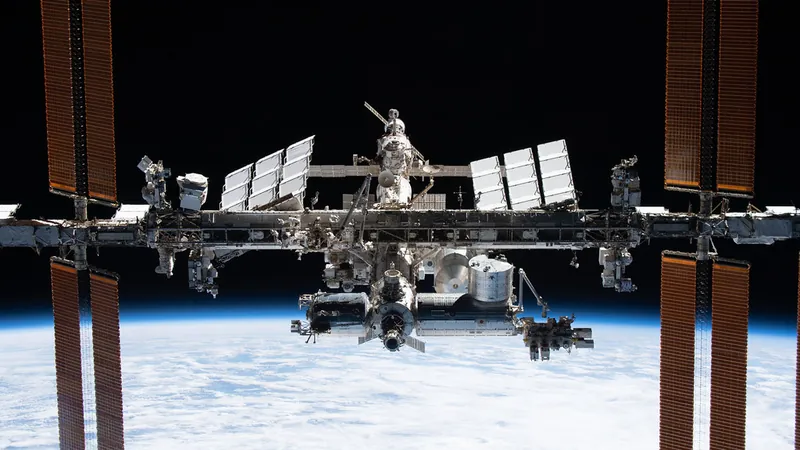
The Next Frontier: Why Outer Space Should Be Your FDI Target Destination
2024-11-12
Author: Amelia
As we venture further into the 21st century, the once fantastical idea of outer space as a hub for foreign direct investment (FDI) is quickly transforming into an astonishing opportunity. This shift is not merely a fleeting trend, but a prospect that could revolutionize industries and alter economic landscapes across the globe as we know them.
Reflecting on my journey in the FDI realm, I remember passionately diving into trends and data in my early career. However, it was my curiosity about space exploration that ignited a unique intersection of interests — one where economics meets the cosmos. Fast forward 20 years, and we’re on the verge of realizing something extraordinary: the rise of in-space manufacturing, which the World Economic Forum predicts could develop into a staggering $1-2 billion annual market by 2035.
What Exactly is In-Space Manufacturing?
In-space manufacturing refers to the process of producing goods in low Earth orbit, taking advantage of the unique conditions present there—such as microgravity and near-vacuum environments—which significantly enhance the quality of certain products. This method, which includes techniques like 3D printing and advanced fabrication, can yield superior materials that are unattainable on Earth. For instance, sectors such as semiconductors, biotechnology, and pharmaceuticals stand to gain substantially, as they require precise configurations and flawless materials that microgravity can uniquely provide.
The International Space Station (ISS), an innovation since its inception in 1998, has primarily served as a platform for scientific experiments. However, as the ISS nears its decommissioning in 2030, companies like Axiom Space are stepping up to fill the void with commercial space stations that will capitalize on in-space manufacturing.
A Market Fuelled by Technological Evolution
The forecast of a burgeoning multibillion-dollar market is bolstered by a significant drop in rocket launch costs and a surge of private investment aimed at developing space-related technologies. Numerous startups are already pioneering in-space manufacturing, including notable names like Redwire and Varda in the US, alongside innovators from Poland and the UK.
However, while the attractions of in-space manufacturing are evident, this paradigm shift also poses challenges. The space manufacturing landscape could complicate global supply chains, making them more intricate as production occurs in space before final assembly on Earth. This complexity may reshape the very fabric of international manufacturing and supply networks.
Opportunities and Considerations for Nations
Countries eager to harness the wealth of opportunities presented by in-space manufacturing must prioritize FDI in high-tech sectors. Nations with a foothold in aerospace technology, such as the US, UK, and Japan, are vying for competitive advantages. Emerging leaders in space, like India, the UAE, and Saudi Arabia, are also positioning themselves strategically. However, success in this realm hinges on significant investments in workforce development and the integration of space technologies into existing industries.
It's important to recognize that no single nation can achieve self-sufficiency in the space sector, given the technological challenges and resource constraints involved. Collaboration and international partnerships, particularly in space infrastructure and technologies, are crucial for sustainable progress.
Redefining FDI Strategies for the New Era
Now is the time for FDI practitioners to rethink their strategies and leverage the burgeoning technological capabilities of locations that will be at the forefront of in-space manufacturing. This leap into outer space will not only alter traditional manufacturing paradigms but also bring forth new FDI patterns. As companies and governments gear up for this uncharted territory, the possibilities for innovation and economic growth are boundless.
As we prepare to enter this new frontier, it is clear that in-space manufacturing has the potential not just to reshape industries but to redefine global economic landscapes. Countries and companies that act decisively will undoubtedly find themselves on the cutting edge of the burgeoning space economy, transforming dreams of the cosmos into tangible financial realities. The cosmos is not just a destination anymore; it’s the next frontier for FDI. Are you ready to take the leap?









 Brasil (PT)
Brasil (PT)
 Canada (EN)
Canada (EN)
 Chile (ES)
Chile (ES)
 España (ES)
España (ES)
 France (FR)
France (FR)
 Hong Kong (EN)
Hong Kong (EN)
 Italia (IT)
Italia (IT)
 日本 (JA)
日本 (JA)
 Magyarország (HU)
Magyarország (HU)
 Norge (NO)
Norge (NO)
 Polska (PL)
Polska (PL)
 Schweiz (DE)
Schweiz (DE)
 Singapore (EN)
Singapore (EN)
 Sverige (SV)
Sverige (SV)
 Suomi (FI)
Suomi (FI)
 Türkiye (TR)
Türkiye (TR)